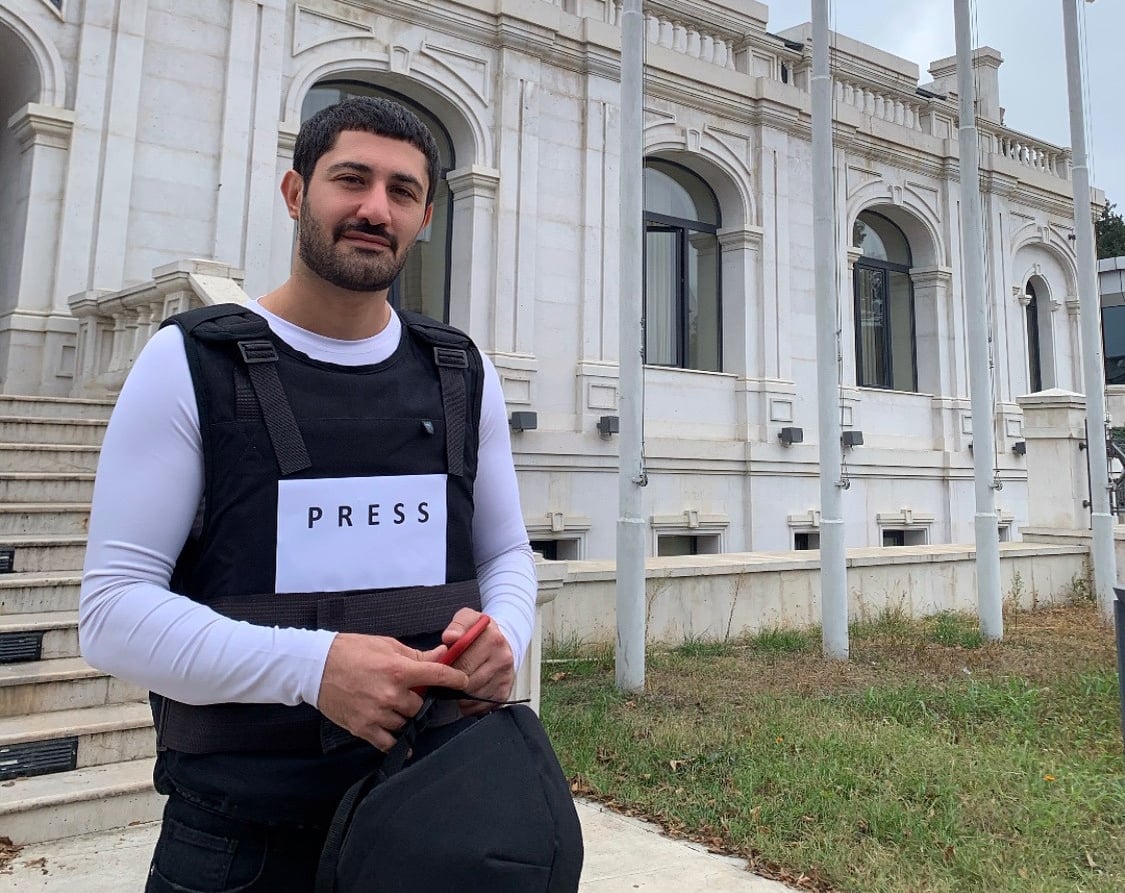When covering a war, teamwork is important, from the journalist to the driver, they have a special role in the correct planning of the work. 1in.am journalist Jirayr Voskanyan says that he went to Artsakh by the decision of the editorial office, but the work of his colleagues working in Yerevan was no less important.
From the beginning of the war until the last day, they worked as a team, helping each other, tightening their belts in difficult moments. They spoke about all sides of the war, about the heroic soldier, the old man defending his house, the children of Shushi, the disruption of daily life, the women who bake “Zhengyalov bread” and are waiting for the men.
Jirayr gets frank with us. Those who went through this war, regardless of their role, came out transformed. He is not an exception.
The Artsakh war was a serious ordeal for journalists, were you ready for that?
The domestic war revealed many gaps, incomplete ideas about ourselves, our neighbors, the world, which is typical of a force majeure. We have a lot to analyze, to research, we have a lot to do.
Journalism under martial law was no exception. Almost all my colleagues, both under fire and behind the scenes, remained faithful to their profession and, most importantly, to the demands of our state.
Although, there were people who built themselves or their activities on the foundation of misinformation based on narrow personal, group interests, from the rationality of serving political issues.
The experience I had during the war as a journalist greatly changed my professional perceptions, gave me confidence and especially deepened the steadfastness of my professional path.
Did you have a work plan, priority, what did you tell your audience?
On the morning of September 27, the call at around 9 o’clock terrified us all. Naturally, without hesitation we hurried to the editorial office․ There was already no discussion that as soon as we arrived, we would start our extraordinary and uninterrupted live work, that our team was heading to Artsakh.
We clarified the work plan on the spot and left for Artsakh on the same day. It was important to be as close as possible to the actual military operations, to tell the story from the ground and about our people, who were entrusted with the defense of our homeland, our home.
I will divide the work of our team in the war into two possible parts: For the first three weeks or so of the war, we devoted ourselves exclusively to the battlefield and to our brave men fighting to the death.
We were in hot spots and positions as much as possible, mostly talking about the soldier, the heroism of the officer and the military operations from the perspective of an eyewitness.
Very often, both when moving to positions or when we were as close as possible to the combat operations, our team found itself under shelling and bombardment. There had even been situations when we thought that it would be our last video and we would think about what to say as we definitely weren’t going to get out of the situation alive.
In the weeks following the war, our target was the support from behind. We spoke about the people who were worthy as supporters of our army.
We spoke about people who did not leave cities and communities that had been targeted from the very first day of the war because they insisted that their presence gives their soldiers strength.
We also talked about people who lived in damp, gray, cold basements for 45 days, about children who in Yerevan forced their parents to return to Artsakh, to their village, to their home, to wait in the yard for their father, brother, sister.
We have introduced people who have made “Zhengyalov bread” under artillery fire, people who, even up to the age of 85, had taken refuge in the forests of their city to take care of their house and, if possible, to help the soldier if things reached to that point.
We have told stories about people who made “Khashlama” in the forests and insisted that the enemy may succeed in displacing them, but will never succeed in uprooting their roots, homeland and aspiration for peace. We spoke about people who prayed in their monasteries for the mother of the enemy, saying, “Let there be no sacrifice on either side, a mother is a mother, the pain is identical and inexplicable.”
We talked about powerful people and superhumans.
What dilemmas did you have while working in Artsakh? What kind of knowledge should a journalist covering a war have?
It is quite difficult to cover a war that directly concerns you, your people, your society, your state. We faced many dilemmas: It is impossible not to be emotional in such conditions.
You can not but share the pain of your compatriot who meets his wounded son, father, mother, sister ․․․ You cannot share the pain of a person who receives the news of the death of a loved one, you cannot remain a mere journalist, when you try to give strength to the children and elderly under fire, you cannot remain a mere journalist, hearing the news of our progress.
When you are in positions where the torrent of rockets and explosions do not stop, when you have access to positions, people, ammunition, deployment, coordinates, military equipment, it is quite difficult not to capture everything.
I think the professionalism lies in that, when, having all the opportunities to present an unprecedented history, you remain loyal to your state, its needs, its security, the soldier and do not endanger their lives and our homeland for the sake of an exclusive story.
Naturally, it is necessary to follow the security rules set by the country, the military department and the center that coordinates the work of journalists.
You need to know for sure that you as an individual are just a means, not an end. A means, because you are important not in such sharp conditions, but as someone standing behind a soldier on the front line, that you have to work in a way that does not harm them and the state.
It is necessary to know the structure of the work clearly and to ask a simple question, why am I doing this, what problem am I solving with this and to answer honestly. I find it very important to stay in touch with people who know how to deal with military affairs, to regularly consult with those who guide you, because not everyone knows how to deal with seemingly very simple realities.
For example, during the war I learned that it is not allowed to shoot a soldier who is wearing a communication device at that moment.
In Shushi you discovered three little boys who became a symbol of war in a span of a few days.
The interaction with the famous children of Shushi personally gave me confidence that I am in the right place, with the right mission. It gave me great faith that regardless of the outcome of this cruel war, we will live free and confident in our strength.
Meeting them and telling their story strengthened my conviction that all of us, regardless of profession, status, opportunities and geography, must remain human, with faith in our future, our state and our identity.
As much as this war changed me personally, so did those little ones: they have solidified my convictions, my values, on which I rely unconditionally.
How would you summarize your journalistic work in Artsakh? Were there any shortcomings?
My team and I have done our best, of course, we can always do more. But in the hard days of the war, we never recoiled, became weak, of course, we were depressed, we were upset, but we never doubted the importance of our work, the necessity of it.
Emphasizing once again the no less hard work of my immediate colleagues in the background, I openly say that we have done a great job, we have succeeded in our work, we have not fallen back.
As a result of the publicization of our heroes from behind, the public is still interested in what they can support. There have certainly been shortcomings, he who does nothing does not fail. These are issues that need to be analyzed and understood separately in our editorial office.
Interview by Gayane Asryan







